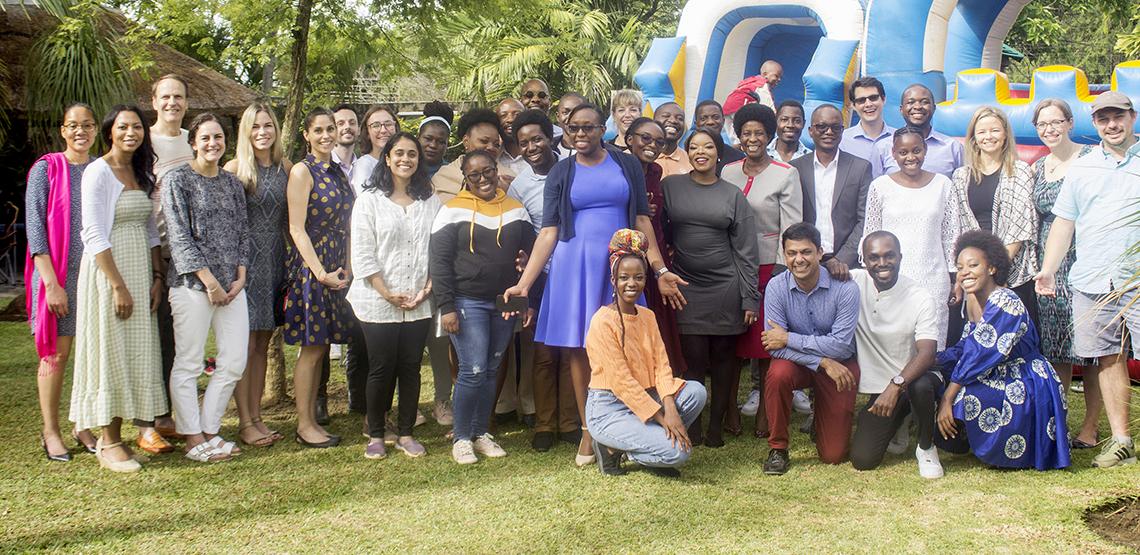Site Visit to Zambia
NINDS-FIC Team Sees ‘Showcase of Amazing Neurological Research’

Photo: Kasakula Kaunda
A delegation of NINDS and FIC staff recently traveled to Zambia to conduct a site visit, meet with NINDS- and FIC-funded investigators and trainees and discuss research gaps, capacity needs and potential opportunities.
Neurological disorders are very common worldwide, yet they disproportionately affect low- and middle-income countries (LMICs) like Zambia. And, like many LMICs, the sub-Saharan African nation has had limited access to neurological research and specialty care resources.
Although NINDS has long funded research in Zambia, until fairly recently the country had no locally trained neurologists. That all changed in 2018 when two U.S. scientists—Dr. Deanna Saylor, a neurologist at the Johns Hopkins University School of Medicine, and Dr. Gretchen Birbeck, a neurologist at the University of Rochester Medical Center—developed the first-ever post-graduate neurology residency training program at the University of Zambia (UZ).

Photo: Kasakula Kaunda
Today Zambia has nine locally trained neurologists and a thriving neuroscience research program. In fact, NINDS currently funds nine research projects conducted at the University Teaching Hospital (UTH) in Lusaka, Zambia’s capital, the UZ, and the Chikankata Mission Hospital (CMH) in Mazabuka.
Research focuses on several leading health concerns in the region—stroke, malaria, epilepsy, HIV and traumatic brain injury (TBI). Projects include investigating hydration and stroke outcomes, evaluating treatments for malaria in the central nervous system, understanding TBI across the lifespan and assessing long-term cognitive outcomes in children and adolescents with HIV.
During the site visit, which took place in January, the NIH team got a direct look at the research infrastructure that was made possible by NINDS funding and attended the graduation ceremony and reception for the neurology residency training program’s class of 2022. The delegation also toured research laboratories and facilities on the UTH and CMH campuses, discussed research challenges and opportunities with senior investigators, and networked with trainees and junior faculty.
Dr. Clinton Wright, director of NINDS’s Division of Clinical Research (DCR) and member of the 7-person travel team, participated in a neurological symposium at the UTH Main Lecture Theatre.
“The symposium provided us with a showcase of the amazing neurological research on tuberculous meningitis, epilepsy, HIV and aging, stroke and other neurological disorders that is currently underway at UTH,” Wright said.
Of special note was a visit to the CMH, located in Zambia’s southern province.
“Visiting the hospital allowed us to see firsthand how neurological clinical care in a low-resourced, rural setting is enhanced with the improved research capacity-building resources,” said Dr. Richard Benson, director of DCR’s Office of Global Health and Health Disparities (OGHHD). “We also learned about the ongoing research on cerebral malaria, epilepsy and neuro-HIV being conducted there.”
Dr. UnJa Hayes, program officer in FIC’s Division of International Training and Research, noted, “We got a chance to meet members of the community, including Her Royal Highness Chieftainess Mwenda, and see how the research projects we fund work with the community to help underserved groups—like people with epilepsy—get the care they need while achieving research goals. It’s all about relationships.”
Before leaving the country, the NINDS delegation was joined by U.S. Ambassador to Zambia Mike Gonzales at a farewell dinner.

Photo: Kasakula Kaunda
“We met many remarkable people throughout our trip,” said Dr. Janna Belser-Ehrlich, DCR chief of staff. “It was a real pleasure getting to know our colleagues in Zambia. We learned a great deal about research infrastructure and capacity, the health care system, the country’s culture and history, as well as NIH’s impact on international research.”
As part of its mission to support global health equity, particularly in LMICs, NINDS participates in the FIC-led Global Brain and Nervous System Disorders Research across the Lifespan program. The effort supports collaborative research and capacity-building projects relevant to LMICs on brain and nervous system disorders throughout life.
NINDS also supports training programs in LMICs through FIC: Launching Future Leaders in Global Health Research Training Program and Chronic, Non-Communicable Diseases and Disorders Across the Lifespan.
In addition to Wright, Benson, Hayes and Belser-Ehrlich, other delegation members were: Stacey Chambers, an OGHHD scientific project manager; Dr. Bridgette Jeanne Billioux, an NINDS staff clinician; and Dr. Hanalise Huff, an NINDS global neuroinfectious disease fellow.
